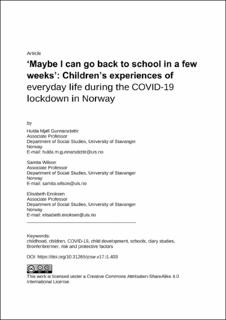| dc.contributor.author | Gunnarsdottir, Hulda Mjöll | |
| dc.contributor.author | Wilson, Samita | |
| dc.contributor.author | Enoksen, Elisabeth | |
| dc.date.accessioned | 2023-01-04T11:33:56Z | |
| dc.date.available | 2023-01-04T11:33:56Z | |
| dc.date.created | 2022-08-22T14:50:12Z | |
| dc.date.issued | 2022 | |
| dc.identifier.citation | Gunnarsdottir, H. M., Wilson, S., & Enoksen, E. (2022). 'Maybe I can go back to school in a few weeks': Children's experiences of everyday life during the COVID-19 lockdown in Norway. Journal of Comparative Social Work, 17(1). | en_US |
| dc.identifier.issn | 0809-9936 | |
| dc.identifier.uri | https://hdl.handle.net/11250/3040894 | |
| dc.description.abstract | This study explores everyday life from the perspective of children during school lockdown in Norway. The outbreak of Covid-19 greatly impacts societies on all levels. Studies have revealed a drastic change in children’s routines through home-schooling and reduced access to physical activities, as well as increase in contact with parents with subsequent potential friction or positive interactions. Children’s own perspective of their experiences during Covid-19 restrictions, nevertheless, appear to be scarce. This study provides a unique insight into ten children’s experiences through examination of their diary entries during lockdown. Our theoretical approach is based Bronfenbrenner’s ecological model of child development, and protective factors and risk factors in child development. Our findings indicate that children’s everyday life experiences during Covid-19 lockdown can be sorted into three different arenas: The home and family life, The school and learning activities, and The social and digital interaction with friends. These three arenas represent important micro-systems in the children’s lives. However, the shutting down of school and society has disrupted the overall ecological systems surrounding the children, increasing the potential weight of risk factors such as loneliness and stress. All arenas and system levels moved inside the children’s primary micro-arena; their homes and family life. Further, all forms of social interaction, both at school, among friends and in family life seem to depend on digital platforms, as the children respond to the new situation by using digital meeting places. Utilizing Bronfenbrenner’s systematic approach, the digital arena appears to manifest a new khrono-system in the children’s lives. The digital screens being what binds all eco-systems together. An important question for further studies is what consequences this has for the future development of childhood, and how do the children cope with this kind of disruption of their everyday lives. | en_US |
| dc.language.iso | eng | en_US |
| dc.publisher | Universitetet i Stavanger | en_US |
| dc.rights | Navngivelse 4.0 Internasjonal | * |
| dc.rights.uri | http://creativecommons.org/licenses/by/4.0/deed.no | * |
| dc.title | "Maybe I can go back to school in a few weeks." Childrens expereinces of everyday life during COVID-19 lockdown in Norway | en_US |
| dc.title.alternative | "Maybe I can go back to school in a few weeks." Childrens expereinces of everyday life during COVID-19 lockdown in Norway | en_US |
| dc.type | Peer reviewed | en_US |
| dc.type | Journal article | en_US |
| dc.description.version | publishedVersion | en_US |
| dc.rights.holder | The author | en_US |
| dc.subject.nsi | VDP::Samfunnsvitenskap: 200 | en_US |
| dc.source.pagenumber | 70-93 | en_US |
| dc.source.volume | 17 | en_US |
| dc.source.journal | Journal of Comparative Social Work | en_US |
| dc.source.issue | 1 | en_US |
| dc.identifier.doi | 10.31265/jcsw.v17.i1.403 | |
| dc.identifier.cristin | 2045012 | |
| cristin.ispublished | true | |
| cristin.fulltext | original | |
| cristin.qualitycode | 1 | |

